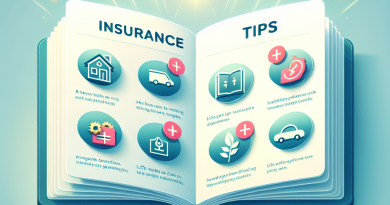Stay Covered on the Open Road: Key RV Insurance Tips for 2025
Heading: Introduction
When it comes to hitting the open road in your RV, having the right insurance coverage is crucial. From protecting your investment to ensuring your safety and financial well-being, RV insurance is a must-have for any avid traveler. In 2024, staying covered on the open road is more important than ever. In this article, we’ll explore key RV insurance tips to keep you protected and prepared for whatever the road may bring.
Heading: Assess Your Needs
Before hitting the road, it’s essential to assess your RV insurance needs. Consider factors such as the value of your RV, how often you use it, and where you plan to travel. These considerations can help you determine the level of coverage that’s right for you. Additionally, think about your personal liabilities and the potential risks you may face on the road. By understanding your needs, you can make informed decisions when selecting your insurance coverage.
Heading: Understand Your Coverage Options
RV insurance typically includes various types of coverage, such as liability, collision, comprehensive, and uninsured motorist protection. Liability coverage helps protect you if you’re at fault in an accident and covers damages to other vehicles or property. Collision coverage pays for damages to your RV in the event of an accident, while comprehensive coverage protects against non-collision events such as theft or natural disasters. Uninsured motorist protection is essential in case you’re involved in an accident with a driver who doesn’t have insurance.
Heading: Review Your Policy Regularly
As your travel plans and RV usage may change over time, it’s important to review your insurance policy regularly. Make sure your coverage levels are adequate and adjust them as needed to reflect any changes in your circumstances. Additionally, be aware of any exclusions, limitations, or additional coverage options that may be available to you. By staying informed and proactive, you can ensure that your insurance policy meets your current needs.
Heading: Consider Additional Coverage
In addition to standard RV insurance, there are several optional coverages that you may want to consider. For example, roadside assistance can provide peace of mind in case of a breakdown or other emergency while traveling. Personal property coverage can protect your belongings inside the RV, such as electronics, clothing, and other valuables. Full-timer coverage is designed for those who live in their RV full-time and may require additional protection beyond a traditional policy. By exploring these options, you can tailor your coverage to suit your specific needs.
Heading: Protect Your Investment
Your RV is a significant investment, and it’s essential to protect it with the right insurance coverage. Make sure your policy includes adequate coverage for the value of your RV and any upgrades or modifications you’ve made. Consider adding replacement cost coverage to ensure that you can replace your RV with a similar model if it’s totaled in an accident. Additionally, be aware of any limits on coverage for personal items or equipment stored in the RV and adjust your policy as needed to protect these assets.
Heading: Shop Around for the Best Rates
When it comes to RV insurance, rates can vary significantly among different providers. Take the time to shop around and compare quotes from multiple insurance companies to find the best rates and coverage options for your needs. Consider factors such as deductibles, coverage limits, and discounts that may be available to you. Additionally, look for insurers that specialize in RV insurance and have a strong reputation for customer service and claims handling. By doing your homework, you can save money on insurance premiums while ensuring that you have the coverage you need.
Heading: Drive Safely and Stay Prepared
While having the right insurance coverage is essential, it’s also important to drive safely and stay prepared for emergencies on the road. Follow traffic laws, avoid distractions while driving, and stay aware of your surroundings at all times. Keep an emergency kit in your RV with essentials such as water, food, first aid supplies, a flashlight, and extra clothing. In the event of an accident, contact your insurance provider immediately and follow their instructions for filing a claim. By taking these precautions, you can help protect yourself and others on the road while enjoying your RV adventures to the fullest.
Heading: Conclusion
In 2024, staying covered on the open road is a top priority for RV enthusiasts. By assessing your insurance needs, understanding your coverage options, and reviewing your policy regularly, you can ensure that you have the protection you need while traveling. Consider additional coverage options, protect your investment, shop around for the best rates, and drive safely to make the most of your RV experience. With the right insurance coverage and preparation, you can hit the open road with confidence and peace of mind.






